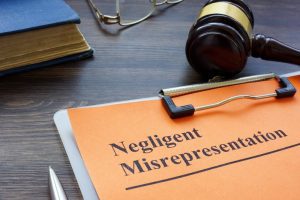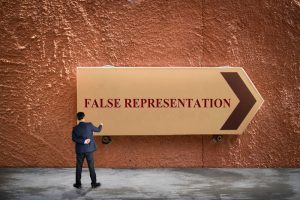Chicago Negligent Misrepresentation Lawyer
 Negligent misrepresentation lawsuits are legal claims against someone who unintentionally makes an untrue statement that causes injury to another person. These civil lawsuits help those who suffer economic losses due to false information someone else gave them.
Negligent misrepresentation lawsuits are legal claims against someone who unintentionally makes an untrue statement that causes injury to another person. These civil lawsuits help those who suffer economic losses due to false information someone else gave them.
After you’ve become the victim of negligent misrepresentation, you’ll wonder how you can get compensation for the losses you’ve suffered because of the false information you were given. Without the help of an experienced lawyer, you probably won’t know about your legal rights and potential remedies. A negligent misrepresentation lawyer helps victims of misrepresentation understand their legal options and fight for the compensation they deserve.
If you believe you suffered damages because of negligent misrepresentation, contact Wallace Miller. Our skilled Chicago intentional tort attorneys have decades of experience handling misrepresentation and fraud claims. Call us today at (312) 261-6193 and learn more about how our Chicago negligent misrepresentation lawyers can help you.
What Is Negligent Misrepresentation?
Negligent misrepresentation is a tort or wrongdoing that occurs when someone makes a false statement of fact without ensuring the accuracy of that statement. That statement causes a financial loss for the victim. The statement can be either written or oral. Negligence occurs when an individual fails in their duty to act reasonably under a given set of circumstances.
Negligent misrepresentation occurs when one party makes a false statement to the other party without exercising reasonable care or diligence in verifying the accuracy of the information when they enter into a contract. When this happens, the party making the false statement may be liable for any losses the other party suffers because they relied on it.
Elements of Negligent Misrepresentation
To prove negligent misrepresentation in Illinois, the plaintiff must demonstrate five elements. These elements are:
- False Statement of a Material Fact: One party must have made an untrue statement. This false statement must be relevant and important to the decision at hand.
- Carelessness or Negligence in Ascertaining the Truth: The party making the statement did not take proper steps to verify the accuracy of their statement.
- Intention to Induce the Other Party to Act: The party making the false statement intended that the other party would act upon it or base their decision upon it.
- Action by Plaintiff in Reliance: The other party acted upon the false statement, believing its validity.
- Losses: The other party suffered actual losses due to their reliance upon the false statement. If no losses occurred, there could be no claim for negligent misrepresentation.
What Are the Other Types of Misrepresentation?
Negligent misrepresentation is not the only type of misrepresentation. Fraudulent misrepresentation occurs when one party knowingly and deliberately makes a false statement of fact, inducing another party to enter into a contract.
Innocent misrepresentation happens when the defendant had a reasonable basis for believing their statement was true when they made this representation to the plaintiff, but then the statement turned out to be false.
Negligent Misrepresentation vs. Fraudulent Representation
The difference between negligent and fraudulent misrepresentation lies in the intent of the one making the representation. With fraudulent misrepresentation, the person making the representation must knowingly make a false statement to mislead or deceive someone. Negligent misrepresentation only requires not exercising reasonable care or competence in obtaining or communicating valid information.
In other words, negligent misrepresentation requires only a failure to exercise reasonable care in providing information, while fraudulent misrepresentation requires knowledge of a statement’s falsity and intent of deception. The difference is crucial because it affects the remedies available to those affected by false statements.
Who Is Liable in a Negligent Misrepresentation Lawsuit?
Any individual or organization that provides false or inaccurate information could be liable in a negligent misrepresentation lawsuit. Potential defendants include individuals, organizations, companies, and even government entities.
In some cases, employees may be liable if they knowingly give false or incorrect information. For example, if a bank employee provides incorrect information regarding a loan or mortgage terms and the consumer suffers losses due to relying on the information, the employee may be liable for negligent misrepresentation, depending on the situation’s circumstances.
Additionally, professionals such as lawyers, accountants, and other experts should be knowledgeable about the information they provide. They could be liable for negligence if their advice is incorrect or inadequate.
 What Compensation Is Recoverable in a Negligent Misrepresentation Lawsuit?
What Compensation Is Recoverable in a Negligent Misrepresentation Lawsuit?
If a person is a victim of negligent misrepresentation in a contract, they may sue in court and potentially recover monetary compensation. Recompense is typically limited to financial damages and does not include personal injury, emotional injury, or pain and suffering.
The court might also grant an equitable remedy such as contract rescission, which cancels the contract and returns each party to their status before reaching the agreement. For example, if a seller tricked a car buyer into purchasing a faulty car based on inaccurate information, they could rescind the contract and recover the money they spent on the car.
What Are Some Defenses in a Negligent Misrepresentation Claim?
The defendant’s available defenses in a negligent misrepresentation lawsuit depend on the particular facts and circumstances of the case. However, some common defenses include:
- Assumption of Risk: Assumption of risk is a defense where the defendant alleges the plaintiff knew of and accepted any potential risks associated with the false statement. This defense focuses on whether the plaintiff voluntarily agreed to take the risk of relying on the allegedly false statement.
- Contributory Negligence: Contributory negligence is a defense where the defendant alleges the plaintiff’s partial fault in causing their own injury or damages. The defendant must prove the plaintiff either knew or should have known of the risks associated with the allegedly false statement and thus should have exercised greater caution.
- Statement of Opinion Rather Than Fact: This defense involves the notion that the defendant cannot be liable for negligent misrepresentation if the statement is subjective rather than factual.
- Puffery: Puffery is a defense where the defendant claims their statement was an exaggerated claim or “puff” rather than a factual representation. For example, if a product description states that a car runs “like new,” it could be considered puffery as it is overly optimistic. Puffery is not actionable under negligent misrepresentation law as an exaggeration rather than a fact.
These are some of the most common defenses used in negligent misrepresentation lawsuits. Ultimately, the defendant’s lawyer will present whichever defense they believe applies given the case’s circumstances, and the court will determine whether it successfully absolves the defendant of liability.
How a Negligent Misrepresentation Attorney Can Help
When a person is the victim of a negligent misrepresentation, they may have grounds for taking legal action against the responsible party. However, the legal process is complicated, so consult an experienced attorney with deep experience handling negligent misrepresentation cases. A seasoned attorney could help victims of negligent misrepresentation in the following ways:
- Identifying the Elements of Negligent Misrepresentation: You must establish all elements of negligent misrepresentation for a successful claim. An experienced attorney can help identify missing elements and determine whether you should pursue a claim.
- Determining the Value of the Client’s Losses: A seasoned negligent misrepresentation attorney will have experience in researching, investigating, and calculating the losses their client has incurred because of the negligent misrepresentation. They will use that number in demands to the at-fault party and in negotiations to attempt to settle the case outside court.
- Building a Legal Strategy: An experienced attorney develops a comprehensive legal strategy tailored to each case. This strategy involves identifying all available compensation and potential defendants, gathering evidence, and understanding the applicable laws.
- Negotiating a Settlement: If a settlement outside of court could prove beneficial, an experienced attorney will handle communications and any negotiations with the defendant on behalf of their client.
- Communicating with Their Clients: A skilled attorney will keep their clients apprised of the case status whenever there’s a change or the client requests an update.
- Representing Clients in Court: If a case goes to court, an experienced attorney provides plaintiffs with zealous representation throughout all stages of litigation.
A skilled Illinois negligent misrepresentation attorney provides invaluable assistance to individuals affected by negligent misrepresentation. From offering legal advice to representing you in court, an attorney can protect your rights every step of the way.
Speak with a Chicago Negligent Misrepresentation Lawyer
After suffering losses due to negligent misrepresentation, speak with a qualified attorney for your best chance of securing a good outcome in your case. At Wallace Miller, our attorneys are experienced in handling all types of negligent misrepresentation cases. We understand the complexities of these cases and will provide legal advice and dedicated counsel throughout the process. In addition, our lawyers will review your situation and build a strong case for the compensation you deserve.
If you are considering filing a negligent misrepresentation claim, don’t wait any longer. Our experienced Chicago negligent misrepresentation lawyers are ready to fight for your rights and the justice you deserve. Contact Wallace Miller today at (312) 261-6193 for legal consultation and learn more about how our negligent misrepresentation attorneys in Chicago can help.


 What Compensation Is Recoverable in a Negligent Misrepresentation Lawsuit?
What Compensation Is Recoverable in a Negligent Misrepresentation Lawsuit?